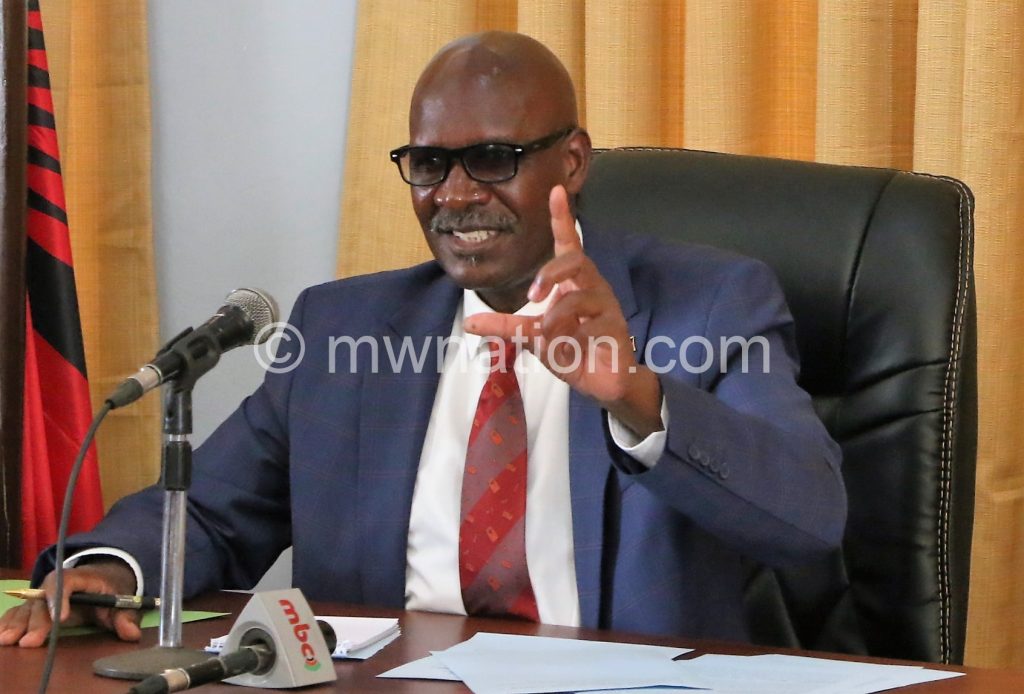No end to AIP mess
Implementation of this year’s Affordable Inputs Programme (AIP) continues to be rocked by several hitches, including absence of suppliers on the ground leading to long queues of beneficiaries at the operational sites.
Minister of Agriculture Lobin Lowe told journalists in Lilongwe on Monday that AIP is also hit by counterfeit fertiliser.

He said the absence of suppliers on the market has led to long queues at two State agencies Agricultural Development and Marketing Corporation (Admarc) and Smallholder Farmers Fertiliser Revolving Fund of Malawi (SFRFFM) depots.
Lowe, who jointly addressed the press conference with Minister of Information Gospel Kazako and Minister of Civic Education and National Unity Timothy Mtambo, said some of the suspects in the counterfeit fertiliser scam were reported to police for further investigation.
He said: “We are getting reports that some people in some areas like Mponela in Dowa are buying national identity [ID] cards from farmers and buy fertilisers.

“Let me warn these people that police, the Anti-Corruption Bureau and National Intelligence Service are on the ground and you will be arrested soon.”
In an interview on Monday, Farmers Union of Malawi (FUM) executive director Jacob Nyirongo said they have also noted with concern that most selling points where farmers accessed the inputs last year are not operational.
He said the situation is forcing farmers to cover long distances to access the inputs at a huge cost.
Nyirongo said some of the challenges facing AIP resulted from government’s delayed contracting of suppliers.
He said: “We are receiving reports from across the country through our structures that farmers are being forced to walk long distances to access the inputs and this is at a cost.
“This is simply because we have erratic supply in most districts. It would have helped to engage suppliers on time.”
Nyirongo appeal ed to government to involve some private companies that have fertiliser, but cannot supply following a misunderstanding over prices for the commodity. He said increasing the number of access points would improve availability of fertiliser and ease congestion.
In his update, Lowe said despite the challenges, government will ensure that farmers have a bumper harvest this year like last season to improve household and national food security.
He said: “To date, farmers have accessed 143 992 metric tonnes [MT], an equivalent of 2 879 840 bags, representing 38.8 percent against the target of 371 411MT [7 428 210 bags].
“This translates to 1 439 920 farming households who have accessed two bags of fertiliser as of on Monday, December 26 2021.”
The minister said 50 percent of maize seeds have so far been sold to farmers and selling of goats to 30 000 households in Nsanje and Chikwawa commenced two weeks ago. He also said 63 private suppliers are involved in the goats component of AIP.
Thus out of 60 000 goats, Lowe said, 4 619 goats have been sold.
AIP is an initiative of the nine political-party Tonse Alliance which succeeded the Farm Inputs Subsidy Programme (Fisp) implemented by the Democratic Progressive Party.
In the 2021/22 budget set to expire in March 2022, government allocated K142 billion towards the programme to benefit 3.7 million farming households.
The AIP allocation represents half of the allocation towards the entire agriculture sector which is K284 billion, according to data in budget documents.
During its inaugural financial year in 2020/21, AIP was initially allocated K160 billion, but later the budget was trimmed to K142 billion during Mid-Year Budget Review. In contrast, Fisp used to benefit about one million farming households and cost approximately K35 million per year.
Critics of the subsidy programme, including the World Bank and International Monetary Fund, argue that it is draining government resources as it is purely consumptive in nature.
For this year’s AIP, Ministry of Agriculture contracted 164 suppliers to take part in the retail, warehousing and distribution of the fertiliser.
But The Nation reported on November 18 2021 that 13 firms, including major agro-dealerships, have pulled out from the exercise despite being issued contracts. Our sister newspaper Weekend Nation also reported on October 30 2021 that government issued most contracts to small and medium enterprises who faced challenges to get loans from commercial banks without solid proof.
In an earlier interview, Parliamentary Committee on Agriculture and Food Security chairperson Sameer Suleman said the committee was worried with the turn of events and would summon the Ministry of Agriculture to explain the numerous irregularities.
In a separate interview, agriculture pol icy expert Tamani Nkhono Mvula said the developments surrounding this year’s AIP point to minimal success of the programme.
President Lazarus Chakwera officially launched this season’s AIP on October 16 2021 in Chiradzulu.





